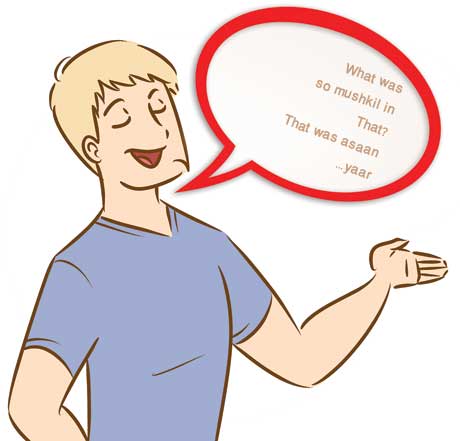I am sure every one of you is familiar with these types of conversations. It’s the use of Minglish. Many of us for a fact regrettably have the habit of switching languages during conversations. One sentence will be in English and the other in Urdu.

Boy 1: Tumhay nai pata that test was so mushkil, I dunoo if I’ll even pass it!
Boy 2: What was so mushkil in that? That was asaan yaar…
Boy 1: Yeah, for you… tumhara math have always been better than mine!
I am sure every one of you is familiar with these types of conversations. It’s the use of Minglish. Many of us for a fact regrettably have the habit of switching languages during conversations. One sentence will be in English and the other in Urdu. We can’t help it; it has become a habit. Maybe, I am in the count too.
You see, there are some people who think in Urdu – or in their mother tongue – and translate their thoughts in English while speaking. Now, the problem is that not many of them take the trouble to semantically transform their thoughts into English before uttering them. The result is a hotchpotch, very hard to digest for any lover of Urdu language. Some use Minglish because they feel adding English to their conversation enhances their position in a group – I call them wannabes; others are forced to speak English as a part of protocol in offices, schools, etc. – my sympathies with them.
People of all ages are using Minglish intentionally or unintentionally. I hear it wherever I go. For example, during my school days, all I was encouraged to do was to speak in English. Nobody ever noticed how adversely it affected my Urdu. The trend was further supported by saying, ‘Aap ki bachi kitni achi angerzi bolti hai!’ (Your daughter speaks English fluently!).
Purists look down on our generation for destroying such an exquisite language. A senior citizen, Syed Shariq, conveys, ‘A language is a source of communication and a root of expression; English and Urdu both should be respected equally. Children are encouraged to speak in English; they would utter three words in Urdu and five in English. I am not against English, but this system is spoiling the richness of Urdu. There should be no amalgamation of languages.’
Zenia Khan, a student, expresses, ‘They just can’t blame us for degrading Urdu. Honestly, whenever it comes to Urdu, they say, ‘Urdu to ati hoge; it’s your mother tongue!’ So what if it is our mother tongue?’
I think Minglish spoken all around the world, with movies like Monsoon Wedding, Bend it like Beckham and Mitr my Friend promoting the trend, is no excuse. To say ‘Mujhay urdu nahi ati’ (I don’t know Urdu) would ruin our beloved mother tongue. If a language is not treasured by its own nation, why would others value it? We should be proud of our traditions and morals. We cannot deny that expressions speak louder when illustrated in our mother tongue. There is always a stronger impact of those lines said in one’s mother tongue than in any other language. Again, bilingualism is no crime, neither is learning new languages; even code-switching is acceptable. How else are we going to order chips in Pakistan than ‘one jumbo fries, please’ because there is no alternate word in Urdu/local dialects? It’s when you start polluting a language at the expense of other, using terms such as ‘nikkah-o-fied’ or ‘universityan’ wherein prefixes/suffixes have been added to borrowed words, that Minglish no longer sounds funny or respectable; it actually demeans the user.